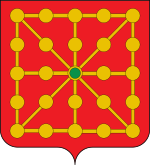
Navarrese nationalism is a political and social movement that claims Navarre to be a nation.
History
Navarrese nationalism was born out of independentist approaches to the reality of the region, different from the proposals of traditional Basque nationalist voices. It wants to establish a sovereign state in Navarre, and they see a historical precedent in the medieval Kingdom of Navarre; or at least achieving a higher status for Navarre inside a hypothetically independent Basque Country, as they consider the ancient kingdom to be the founder of current Basque institutions.
Even if it is a minoritary movement, it has trends within it. Some of their members are near the abertzale left, with a similar ideology to that of Basque separatism; others are moderates, who want a more controlled and steady concession of sovereignty to Navarre; and there is also a sector identified with the political right. The conservatives, after the promulgation of the Agreed Law (1841) and the dictatorship of Francisco Franco (1936-1978), are now defenders of foralism, rather than nationalism, existing in the Basque Country a sector close to the ideals of the Basque Nationalist Party.
A 2005 survey found that only 36.8% of Navarrese residents reported a "predominant feeling of Navarrese national identity". In 2019, another survey showed an increase to 52.16% in that same question.
References
- ^ Nekane Pérez Salvatierra. «Antiguamente Navarra era un reino independiente...». Nabarralde. 21 de septiembre de 2009.
- Tomás Urzainqui. «Euskal Herria no es el sujeto político». Noticias de Navarra. 3 de diciembre de 2010.
- «Nace el partido Libertad Navarra, que busca "movilizar el voto del patriotismo navarro"». Diario de Navarra. 24 de octubre de 2014.
- Pedro Esarte. «El mariscal Pedro de Navarra defendía un Estado con territorialidad, independiente de Francia y de Castilla». Noticias de Navarra. 13 de octubre de 2012.
- «La iniciativa 'Etxarri-Aranatz 2012+1' pide una consulta sobre una 'Euskal Herria independiente'». Noticias de Navarra. 25 de enero de 2013.
- Lola Galán. «Sectores del nacionalismo navarro, conservador y no separatista, votaron contra la OTAN». El País. 27 de marzo de 1986.
- Ángel Pascual. «El imposible nacionalismo navarro». El País. 23 de mayo de 2003.
- Bergantiños, Noemi (2011). Güell, Pedro Ibarra; Ametzaga, Xabier Irujo (eds.). Basque Political Systems: Political Culture in the Basque Country (PDF). Translated by Watson, Cameron J. Reno, Nevada: Center for Basque Studies of the University of Nevada, Reno. p. 215. ISBN 978-1-935709-03-9.
- Fernandez, Ibai (2019-01-06). "Navarra es la comunidad con menor sentimiento de españolidad". Diario de Noticias de Navarra (in Spanish). Retrieved 2022-10-30.
| Movements of regionalism, separatism and stateless nationalism in Europe | |
|---|---|
| Albania | |
| Azerbaijan | |
| Belgium | |
| Bosnia and Herzegovina | |
| Croatia | |
| Cyprus | |
| Denmark | |
| Finland | |
| France | |
| Georgia | |
| Germany | |
| Greece | |
| Italy | |
| Kazakhstan | |
| North Macedonia | |
| Moldova | |
| Netherlands | |
| Norway | |
| Poland | |
| Romania | |
| Russia | |
| Serbia | |
| Spain | |
| Sweden | |
| Turkey | |
| Ukraine | |
| United Kingdom | |
| See also | |